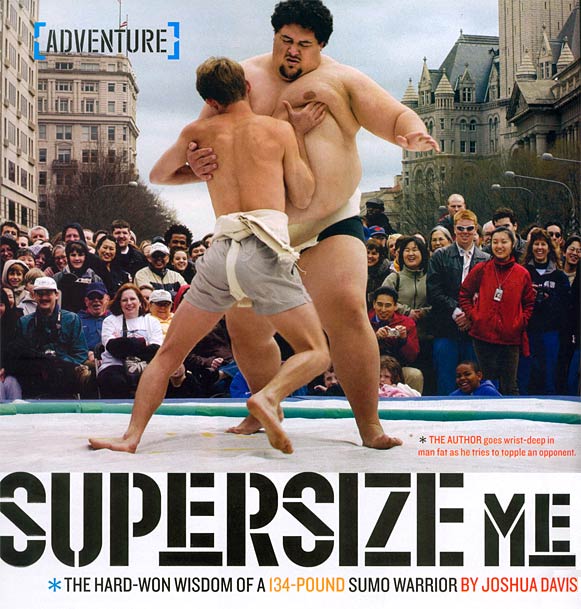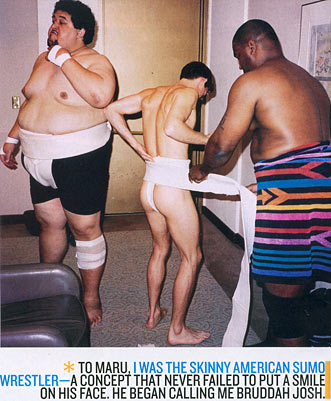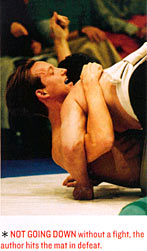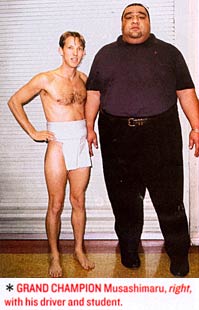|
|

 ARCUS BARBER IS READY TO FIGHT. The six-foot-six, 460-pound
amateur sumo star stomps over to one side of the sumo ring in this
Los Angeles hotel ballroom and rests his hands on his prodigious
belly as if it were a card table. This is the first open weight
match of the U.S. Sumo Open and the crowd of nearly a thousand is
excited. They start clapping in unison but suddenly fall silent
when I step forward.
ARCUS BARBER IS READY TO FIGHT. The six-foot-six, 460-pound
amateur sumo star stomps over to one side of the sumo ring in this
Los Angeles hotel ballroom and rests his hands on his prodigious
belly as if it were a card table. This is the first open weight
match of the U.S. Sumo Open and the crowd of nearly a thousand is
excited. They start clapping in unison but suddenly fall silent
when I step forward.
“And on the other side of the ring,” the
announcer purrs through the mike, “at 134 pounds, we have the lightest
man to ever sumo at the U.S. Open….”
I pop in my mouth-guard and trot out to
the ring wearing the mawashi, the classic sumo diaper. The paramedics
in the corner stand up. I can hear murmurs of concern, but almost immediately
the atmosphere starts to change. Though Barber weighs nearly three times
what I do, the audience can sense my confidence; they sense there’s some
other force at play here. And they’re right. I may look skinny, but I’ve
mastered the attitude of a fat man. I lightly slap my wiry stomach, stretch
out my arms and stare blankly at Barber. The crowd starts chanting my
name.
If my opponent is intimidated, he doesn’t
show it. He’s one of North America’s best heavyweight sumo wrestlers and
is known for his stability. He is almost impossible to knock over.
Before stepping forward, I glance to my
left. There’s a 530-pound man sitting next to the announcer. He wears
the distinctive topknot of the professional Japanese sumo wrestler - he’s
not an amateur like Barber and me. His name is Musashimaru, or Maru for
short, and he is widely thought to be one of the best sumo wrestlers of
all time. Though nobody knows it, he is also my coach.
Maru slightly nods at me and I bow to Barber.
We squat in the middle of the ring, and I stare calmly into my opponent’s
round, goateed face. In ten seconds, I will slam violently into his belly
and demonstrate that being fat is a state of mind.

I'M FIVE NINE AND USUALLY weigh less than 130 pounds, but I’ve
always wanted to be a much bigger man. To me, fat is a sign of maturity.
Sumo, I thought, offered me a chance to learn how to be big.
So I showed up at the Jun Chong Martial
Arts Center in West Los Angeles for the California Sumo Association’s
weekly training session. It was a classic karate gym: A dozen kids were
trying to kill each other while their parents looked on approvingly.
“Is sumo time!” announced Svetoslav Binev,
a squat, heavily muscled Bulgarian who is the resident sumo coach. The
kids cleared out, Binev wrapped me in a long canvas strip, briefly went
over the rules, and motioned me into the ring with the founder of the
sumo association, an emaciated-looking 142-pound guy named Andrew.
“Go for his throat,” Binev hinted. “It will
throw him off balance.”
My opponent slapped his belly lazily, as
if it were quite large, though he looked malnourished. Still, I was intimidated.
I didn’t really know what I was doing, but in a moment, Binev shouted
something in Japanese, and Andrew slammed into me. I didn’t have time
to go for his throat, because he already had his hands on my diaper and
was yanking it up. I could feel my balls get cinched, and a wave of anger
swept over me. Suddenly, I started screaming at him in a deep faltering
bass yell. It was a voice I’d never heard before. The voice, perhaps,
of a much fatter man.
 Instinctively, I grabbed Andrew’s diaper
and yanked him towards the edge. He did the same to me and we began the
sumo dance that occurs when opponents spin around and around as they try
to hurl each other out of the ring. At the last moment, I pivoted, rolled
him over my belly, and smashed him to the ground. Instinctively, I grabbed Andrew’s diaper
and yanked him towards the edge. He did the same to me and we began the
sumo dance that occurs when opponents spin around and around as they try
to hurl each other out of the ring. At the last moment, I pivoted, rolled
him over my belly, and smashed him to the ground.
“Wow,” Andrew shouted, leaping to his feet.
“That was great.”
“Very nice,” Binev agreed. “You have the
fighting spirit.”
I was coursing with adrenaline. I felt like I had been stripped
down to my most basic self. For the first time in memory, I was
comfortable in my body. I was still skinny but I had moved like
a big man. I had stayed low and used my leverage. I had used my
belly.
“Now we see you and Larry,” Binev said,
nodding at a 285-pound guy in the corner.
Larry lumbered over and bowed. I bowed back
and realized I wasn’t afraid. Larry was at least twice my weight, and
I was prepared to kick his ass.
Binev signaled and Larry lunged. I dodged
left, pivoted and drove into him as hard as I could. He took two small
steps back, recovered and began a 285-pound steamroll toward me. But at
the last minute, I squatted low, grabbed his diaper and rolled him over
my right leg. He landed heavily on his back outside the ring and I came
spinning down on top of him.
“Fantastic,” Binev shouted, slapping me
on the back. And though my beginners luck would soon run out, Andrew told
me that if I trained hard, I had a good shot at medalling in my weight
class at the U.S. Open.
“But first we make you more bigger,” Binev said, tapping my bony
chest. “You get bruised bone otherwise.”

WHEN I GOT HOMEI had trouble breathing. My arms were streaked with
kaleidoscoping yellow and blue bruises and a sneeze hurt so bad I felt
like I was going to pass out. My first afternoon of sumo had wreaked havoc
on me. We had wrestled for two hours, and both of my opponents had begun
consistently beating me by using different techniques. I clearly had a
lot to learn, but the prospect of competing at the U.S. Sumo Open was
thrilling.
I stopped jogging and began eating
as much as I could. I definitely started to feel bigger. Within three
weeks of eating six to seven meals a day, I was up to 132.
I spent every other Sunday training with Andrew, Larry, Binev and
a steady stream of other wrestlers. I could feel my moves improving
I was encouraged by a few wins against the bigger guys though
the bruises on my chest only worsened.
About a month before the U.S. Open, Andrew called me at home. He
sounded a little nervous and explained that one of the guests of
honor for both the National Cherry Blossom Festival in Washington
D.C. and the U.S. Sumo Open in Los Angeles was Musashimaru, aka
Maru. Maru was a Hawaiian who moved to Japan when he was 18 and
rose to become a Yokozuna, a grand champion, a legend in
the world of sumo. And he needed a driver.

A 530-POUND MAN has a strange effect on his environment.
Before Maru pushed through the arrival doors at Dulles Airport,
near Washington D.C., all the light seeping through the edges blacked
out . When the doors opened, an enormous man filled the gap. He
was wearing a velour sweatsuit made by a Japanese street-wear brand
called International Black Brother and was followed by a personal
hairdresser (obligatory company for a Yokozuna), who carried
Maru’s tiny Louis Vuitton backpack. On the bag was a plastic tag
that announced in Japanese that it belonged to the “grand champion.”
 I started
bowing immediately. Maru took no notice and kept walking until I introduced
myself as his driver. He seemed amused. His eyebrows naturally angled
up over his brutish face, making him look as if he were perpetually surprised
by how small others were. I started
bowing immediately. Maru took no notice and kept walking until I introduced
myself as his driver. He seemed amused. His eyebrows naturally angled
up over his brutish face, making him look as if he were perpetually surprised
by how small others were.
“You?” he said.

I DIDN'T FULLY appreciate the stature of my passenger until
a few days later, when our SUV was chased for two blocks at the
National Cherry Blossom Festival in D.C. One Japanese guy kept trying
to push his face through the window, and a number of women hoisted
their babies in the air, hoping that Maru would roll down the window
and touch the children for good luck. The Japanese regarded him
as a near deity, but in public he was taciturn, rarely spoke and
never smiled. He was known for his fierceness in the ring and his
reserve outside and seemed to be all the more revered for it.
The grand champion had been
to the mainland United States only once, and he peppered me with questions
about the capital. Unfortunately, I barely knew where we were.
“Here’s
the Washington Monument and the White House and some other stuff,” I said,
sweeping my arm vaguely when we first drove past the Mall.
Maru rolled
down his window and waved at the White House. “Hi Bush,” he sang. “Hi
Bushy bushy bushy!”
“I saw his daddy vomit,” Maru said with a mischievous
smile. He had met three past American presidents and had attended the
infamous dinner when Bush senior threw up. “It wasn’t pretty.”
Maru asked me how I came to be his driver, and I explained that
I was a competitor. From that moment on, he treated me differently.
The very idea of me, the skinny American sumo wrestler, never failed
to bring a smile to his face. He started calling me Bruddah Josh
in his relaxed Hawaiian English and included me in everything he
did. We ate sushi almost every day, and he would order two of everything
on the menu: one for him and one for me.
“We need to put some belly on you,” he’d say, patting his stomach.
“I wish I could give you some of mine. I really want to get down to 400
pounds.”
I was meeting Maru at a difficult time in his life. When a wrestler
achieves the rank of grand champion, he is not allowed to post a losing
record. If he does, he is expected to retire. Maru had broken his wrist,
started losing and, in keeping with the tradition, announced that he was
officially retiring this coming October. He had had one of the fastest
rises through the ranks in sumo history and was only 32, but he already
reminisced like an old man.
“I was so worried when I first got to Japan,”
he said one day over a two-foot long unagi roll. In high school on Oahu,
he had been a football star and was recruited by colleges on the mainland.
But his coach introduced him to a sumo recruiter who offered him a three-month
trial in Japan. Maru wanted to help support his family, so he accepted,
though he knew almost nothing about the sport. But his main concern at
the time was more prosaic: “I just didn’t want to show everybody my butt.”
Maru constantly surprised me. Our first
morning in the car, he shyly asked me what kind of music I liked. When
I said I was open to anything, he pulled out a CD from his Louis Vuitton
backpack. It was a mix of Abba tunes, the Grease soundtrack and Rupert
Holmes’ piña colada song.
Later, in Los Angeles, we visited with Samoan Godfather, the don
of the Boo-Yaa Tribe and the man behind such rap songs as “Bury
U, Bury Me” and “Pimpin', Playin', Hustlin'.” Though he’s not a
big rap fan, Maru befriended the former Los Angeles gang leader
in Japan ten years ago while the Tribe was living in Japan. As I
quietly sat on the couch, the grand champion and the godfather commiserated
about high real estate prices.
“But interest
rates are just too good right now, dawg,” the godfather said.

AT A SUMO demonstration in D.C., Maru informed me that it
was time to work on my tachai, the sumo charge. His hairdresser
helped him into a pair of shorts, and Maru crouched slightly, his
hands on his thighs. Then he instructed me to hit him as if it were
the U.S. Open. The spectators, a bunch of high school students studying
Japanese, were expecting a lecture on the history of sumo. What
they got was me smashing into Maru and recoiling. It felt like colliding
with cement.
“You’re leaping like
a skinny man,” Maru told me. He instructed me to squat lower, advance
my feet and use my weight. “None of this leaping stuff.”
To demonstrate,
he said he would charge me. I took a deep breath. Not many people get
to experience the charge of a grand champion. I readied myself, and he
slammed into me with his head down. The air left my lungs with a whoosh,
and for an instant I was airborne. But I had gained weight, both physically
and mentally, and I landed on the ground with an impressive thud.
“It’s
all about learning how to use your weight,” Maru said.

 EGG ROLLS
chicken wings, coleslaw, two whole fish, steak, corn, boiled shrimp, a
vanilla sponge cake and a two-foot tall bowl of layered triple chocolate
cake (brownies, sponge cake, and pudding with Cool Whip separating each
layer). Almost immediately upon out arrival at Maru’s aunt’s house at
a military base in Virginia, she laid out a massive Samoan-themed feast,
and Maru insisted I sit at the head of the table. EGG ROLLS
chicken wings, coleslaw, two whole fish, steak, corn, boiled shrimp, a
vanilla sponge cake and a two-foot tall bowl of layered triple chocolate
cake (brownies, sponge cake, and pudding with Cool Whip separating each
layer). Almost immediately upon out arrival at Maru’s aunt’s house at
a military base in Virginia, she laid out a massive Samoan-themed feast,
and Maru insisted I sit at the head of the table.
“Bruddah Josh is a sumo
wrestler,” Maru told his aunt, “He just don’t look it yet.”
I gained twelve pounds in the space of an afternoon. After two hours
of eating, Maru leaned forward and looked at me solemnly for a moment
before telling me that he wanted to show me some advanced sumo techniques.
He noted that no matter how much I ate, I wasn’t going to gain 200
pounds in five days. I was going to be competing against “big boys”
at the U.S. Open. It was time to take my sumo to the next level.
Maru shouted an order at his hairdresser, who leapt to his feet.
The champion pushed himself up and explained that there was a move
a small guy could use to beat someone much larger. Under Maru’s
direction, the hairdresser grabbed the back of Maru’s shorts and
demonstrated how to trip him through an ingenious twist of the hip.
It was a revelation.
Then Maru ordered me to go to sleep. He told me it was the best way to
turn food into fat. His aunt pointed me into a bedroom accented with pictures
of vivid blue waves and white sand beaches. My belly ached, but I was
giddy. I felt like I had been initiated into a secret language, the language
of weight. I eventually fell asleep and dreamed of giant, cresting waves
of Cool Whip.

A LARGE CROWD of people is struggling to get into the ballroom
at the New Otani Hotel & Garden in downtown Los Angeles. The U.S. Sumo
Open has already sold out, and the chandeliered ballroom is packed with
more than 800 people. Some stand shoulder to shoulder against the walls
or squat in the gaps between seating areas. Maru sits directly in front
of the sumo ring and is the only person who has a little space to himself.
I’m not feeling so good. For the first time, I’m wearing the
mawashi with nothing underneath and everyone can see my ass. Plus, I’ve
had nightmares about it falling off, so I tied it too tight and now it’s
crushing my balls and making me nauseous. I try to nonchalantly pull it
down a bit, but can’t bring myself to fidget with my crotch in front of
so many people.
There are twenty-three competitors, seven of them in the
lightweight division, and the program for the event details an intimidating
list of accomplishments beside each man’s picture. Most of the lightweights
are near the 187-pound limit, and almost all of them have won medals at
previous competitions. The list of accomplishments beside my picture is
blank. I am also the only one in the photos wearing glasses.
But the picture
was taken a month ago, and I’m a better wrestler now. I’m bigger too;
I’m up to 134 pounds and, most important, I feel substantially larger.
The one thing I haven’t learned is how to stay calm during a major sumo
tournament.
To be honest, I am scared. The other competitors milling around
are huge, and nobody’s smiling. It’s no fun to be in a room with twenty-two
diaper-clad men who want to kill you. I can feel my fighting spirit slipping.
I want to go home, but when my name is called, I lope up to the ring.
My lightweight matches go by in a blur of limbs and heavy impacts.
I know I’ve lost my cool I’m leaping off the start each time and
extending my center of gravity. My opponents (a Mongolian, a lawyer,
a UCLA student) sense that I’m not grounded. They come at me low
and repeatedly drive me backwards and out of the ring. I need to
relax, get low and feel my weight.
With each match, I gain a measure of confidence and by the time
I am called to the ring to for the open weight division, I’m calm.
“Stop leaping,”
Maru quietly insists. “And do how I taught you now.” I nod and step into
the ring.
Marcus Barber, my 460-pound opponent, looks like an avalanche waiting
to happen. The referee bows slightly, and we prepare to attack.
But at the go, I dodge his massive, flailing arms, and latch on
to the back of his diaper like Maru taught me. I’ve made it. Barber
is momentarily stunned that I have the advantage. The audience goes
crazy.
I stick my
leg forward and pull as hard as I can on Barber’s backside. In theory,
this is the point when he is supposed to stumble forward and trip over
my outstretched leg. I would then humbly bow and accept victory.
But he doesn’t budge. I pull again and feel panic rising in me.
I can’t move him. As his arms strain to reach my diaper, I try pulling
myself into a defensive position behind him. It doesn’t work. He
latches on to the diaper, heaves me into the air and gently carries
me out of the ring.
“You put up a good fight for a little guy,” he says.
Immediately after
the tournament ends, an 8-year old boy and his father approach me. The
boy asks me to sign his program. I laugh, thinking it’s a joke. I bitterly
ask the kid why he wants my autograph and he looks nervously at his shoes.
“Because you had the most fighting spirit,” his father says. “You should
have given up but you didn’t and that meant a lot to my son.”
In the next
ten minutes, a half-dozen people ask for my autograph, and it slowly dawns
on me that I’ve come a long way from when I weighed 128 pounds. I may
not be fluent in the language of weight yet but I can definitely hold
a conversation.
At one point, Maru looks up from his own, much larger
mob of autograph seekers and waves me over.
“Bruddah Josh,” he says. “You
fought hard. We just gotta get you a little fatter.”
|

|

|

|
Dohyo
(ring): The California
Sumo Association sells portable rings: large square
plastic mats that come with strips of foam attached
to form the raised edges of the classic fifteen-foot-diameter
dohyo. Starts at $3500.
Mawashi (diaper): Idaho-based Blackfoot
Canvas Co. has diversified its tepee business and now
makes a line of canvas diapers for the discerning wrestler.
$37 to $76; blackfootcanvas@hotmail.com.
To tie one, you'll need a friend and some instructions.
Try www.e-sanpuku.co.jp.
The Rules: Sumo is very simple. Push your opponent out of the ring or make him touch the ground with anything other than his feet and you win. There's one other way to win if you pick up your opponent and walk | out of the ring with him in your control, you are the victor even though you stepped out first.No eye gouging, closed-fist punches, groin hits, hair pulling, or kicking. Full-force face slapping is allowed in professional sumo but not in amateur, so you'll have to go to Japan if you want to be bitch-slapped by a 500-pounder.
Solo Sumo Training: Believe it or not, you can practice alone. In Japan wrestlers spend hours slamming into a thick wooden pole called a teppo. But in lieu of an official sumo pole, just about any pillar will do, as will, say, the corner of an office building. Simply squat low, slide your right foot forward, partially extend your right arm, and crush the palm of your hand into the wall with a guttural scream. This strengthens the wrist and teaches aspirants to hit hard. It also helps relieve tension.
|
|
|
|
|





